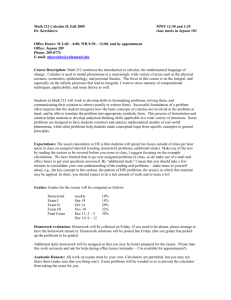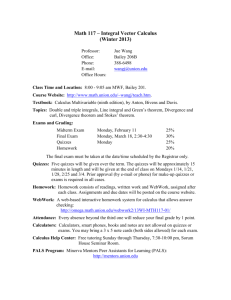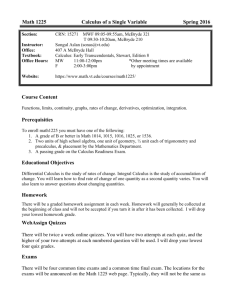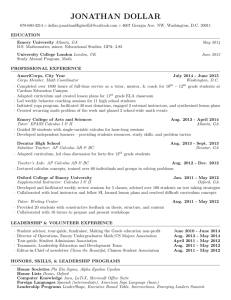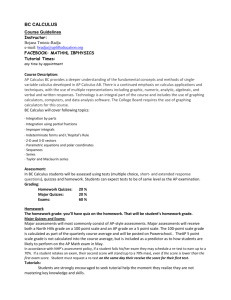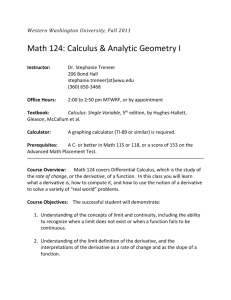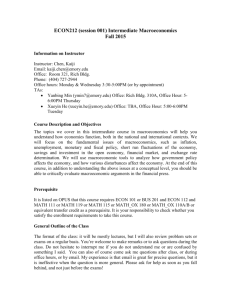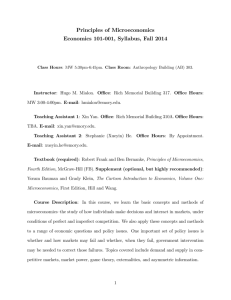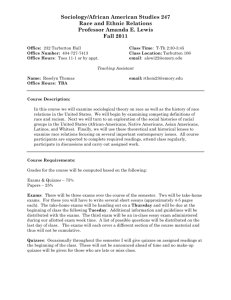File
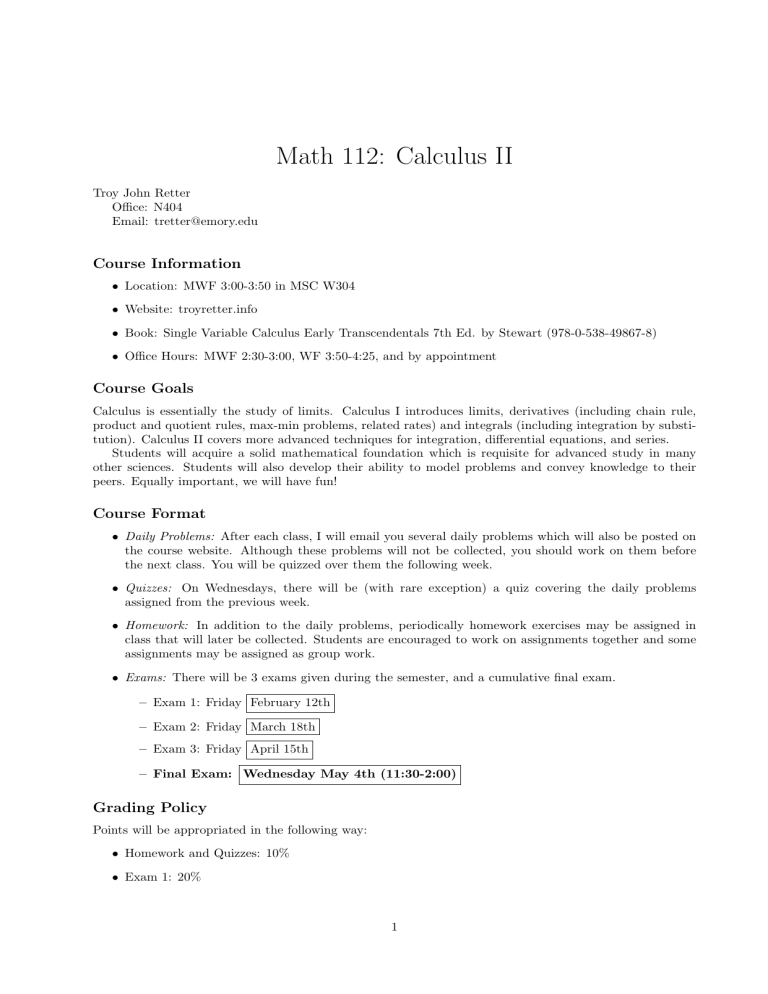
Math 112: Calculus II
Troy John Retter
Office: N404
Email: tretter@emory.edu
Course Information
• Location: MWF 3:00-3:50 in MSC W304
• Website: troyretter.info
• Book: Single Variable Calculus Early Transcendentals 7th Ed. by Stewart (978-0-538-49867-8)
• Office Hours: MWF 2:30-3:00, WF 3:50-4:25, and by appointment
Course Goals
Calculus is essentially the study of limits. Calculus I introduces limits, derivatives (including chain rule, product and quotient rules, max-min problems, related rates) and integrals (including integration by substitution). Calculus II covers more advanced techniques for integration, differential equations, and series.
Students will acquire a solid mathematical foundation which is requisite for advanced study in many other sciences. Students will also develop their ability to model problems and convey knowledge to their peers. Equally important, we will have fun!
Course Format
• Daily Problems: After each class, I will email you several daily problems which will also be posted on the course website. Although these problems will not be collected, you should work on them before the next class. You will be quizzed over them the following week.
• Quizzes: On Wednesdays, there will be (with rare exception) a quiz covering the daily problems assigned from the previous week.
• Homework: In addition to the daily problems, periodically homework exercises may be assigned in class that will later be collected. Students are encouraged to work on assignments together and some assignments may be assigned as group work.
• Exams: There will be 3 exams given during the semester, and a cumulative final exam.
– Exam 1: Friday February 12th
– Exam 2: Friday March 18th
– Exam 3: Friday April 15th
– Final Exam: Wednesday May 4th (11:30-2:00)
Grading Policy
Points will be appropriated in the following way:
• Homework and Quizzes: 10%
• Exam 1: 20%
1
• Exam 2: 20%
• Exam 3: 20%
• Final Exam: 30%
Course Policies
• Contacting Troy: The best way to reach me is at office hours. You can also email me to ask a question or to schedule an appointment. If I don’t reply in 36 hours, please email me again!
• Calculators: Calculators will not be allowed during quizzes or exams.
• Exams: If a student leaves the room during an exam, they will not be permitted to return and continue working on the exam. Plan accordingly.
• ‘A student who fails to take any required midterm or final examination at the scheduled time may not make up the examination without written permission from a dean in the
Office for Undergraduate Education. Permission will be granted only for illness or other compelling reasons, such as participation in scheduled events off-campus as an official representative of the University.’ http://catalog.college.emory.edu/academic/policies-regulations/incomplete-absence.html
• Use of Electronic Devices During Class: Use of all electronic devices is prohibited without consent.
Honor Code
All students must follow Emory’s Honor Code. In particular, each student must complete quizzes and exams without assistance.
http://catalog.college.emory.edu/academic/policies-regulations/honor-code.html
Opportunities for Extra Help
In addition to office hours, Calculus help sessions are held W and Th from 5:30 - 7:30 in MSC W302. Tutors are also available through EPASS.
http://college.emory.edu/oue/student-support/epass/tutoring.html
Students requiring Accommodations (ADSR)
Students requiring accommodations should contact me so that necessary arrangements can be made. Note:
If you plan on taking an exam in the Testing Center, you must schedule the exam and notify me at lest 7 days before the exam. Also, if you are eligible for extra time on an exam, you should plan on taking the exam in the testing center. See the Access, Disability Services, and Resources (ADSR) for more information.
http://equityandinclusion.emory.edu/access/students/index.html
Comments
• This syllabus is a general plan for the course. Unexpected circumstances may necessitate deviations.
• If you have comments or thoughts about this course could be improved, please let me know.
• Have a great semester!
2

